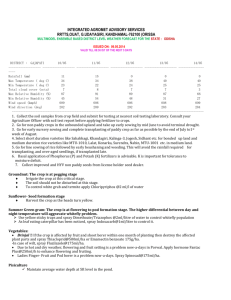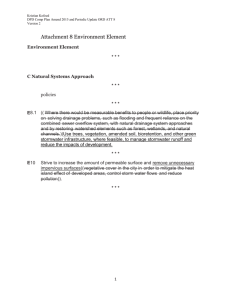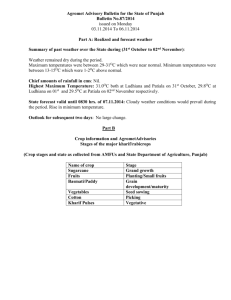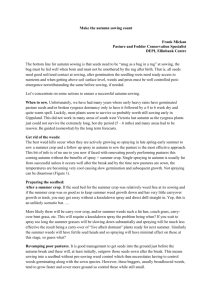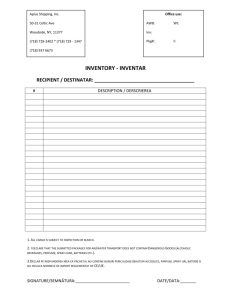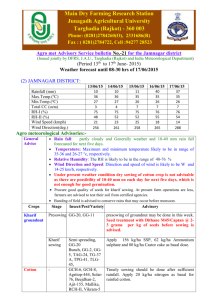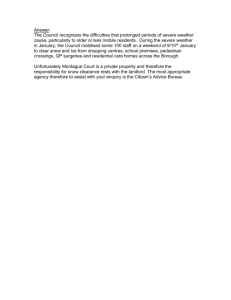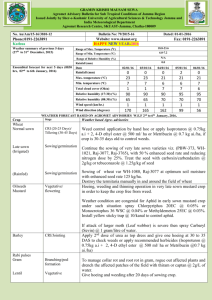GOVT
advertisement
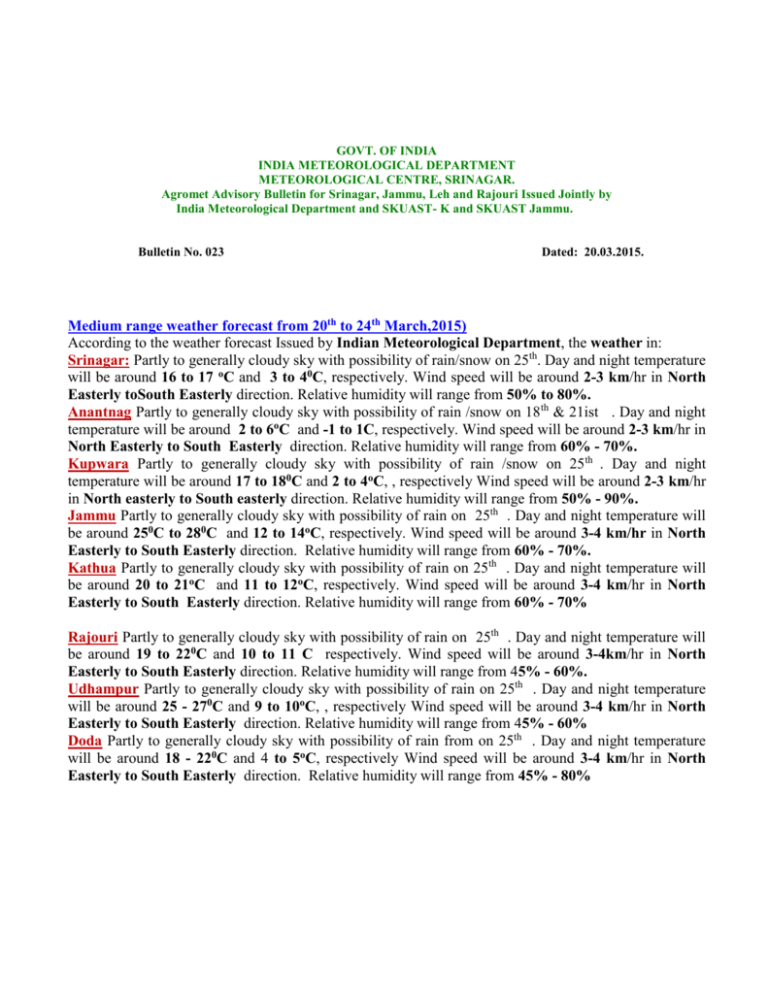
GOVT. OF INDIA INDIA METEOROLOGICAL DEPARTMENT METEOROLOGICAL CENTRE, SRINAGAR. Agromet Advisory Bulletin for Srinagar, Jammu, Leh and Rajouri Issued Jointly by India Meteorological Department and SKUAST- K and SKUAST Jammu. Bulletin No. 023 Dated: 20.03.2015. Medium range weather forecast from 20th to 24th March,2015) According to the weather forecast Issued by Indian Meteorological Department, the weather in: Srinagar: Partly to generally cloudy sky with possibility of rain/snow on 25th. Day and night temperature will be around 16 to 17 oC and 3 to 40C, respectively. Wind speed will be around 2-3 km/hr in North Easterly toSouth Easterly direction. Relative humidity will range from 50% to 80%. Anantnag Partly to generally cloudy sky with possibility of rain /snow on 18th & 21ist . Day and night temperature will be around 2 to 6oC and -1 to 1C, respectively. Wind speed will be around 2-3 km/hr in North Easterly to South Easterly direction. Relative humidity will range from 60% - 70%. Kupwara Partly to generally cloudy sky with possibility of rain /snow on 25th . Day and night temperature will be around 17 to 180C and 2 to 4oC, , respectively Wind speed will be around 2-3 km/hr in North easterly to South easterly direction. Relative humidity will range from 50% - 90%. Jammu Partly to generally cloudy sky with possibility of rain on 25th . Day and night temperature will be around 250C to 280C and 12 to 14oC, respectively. Wind speed will be around 3-4 km/hr in North Easterly to South Easterly direction. Relative humidity will range from 60% - 70%. Kathua Partly to generally cloudy sky with possibility of rain on 25th . Day and night temperature will be around 20 to 21oC and 11 to 12oC, respectively. Wind speed will be around 3-4 km/hr in North Easterly to South Easterly direction. Relative humidity will range from 60% - 70% Rajouri Partly to generally cloudy sky with possibility of rain on 25th . Day and night temperature will be around 19 to 220C and 10 to 11 C respectively. Wind speed will be around 3-4km/hr in North Easterly to South Easterly direction. Relative humidity will range from 45% - 60%. Udhampur Partly to generally cloudy sky with possibility of rain on 25th . Day and night temperature will be around 25 - 270C and 9 to 10oC, , respectively Wind speed will be around 3-4 km/hr in North Easterly to South Easterly direction. Relative humidity will range from 45% - 60% Doda Partly to generally cloudy sky with possibility of rain from on 25th . Day and night temperature will be around 18 - 220C and 4 to 5oC, respectively Wind speed will be around 3-4 km/hr in North Easterly to South Easterly direction. Relative humidity will range from 45% - 80% AGROMET ADVISORY SERVICES BULLETIN FOR SRINAGAR Crop Wheat/oats/ sarson/peas Saffron Stage brown Advisory Vegetative stage Maintain drainage channels in the fields. Vegetative stage Open drainage channels to avoid water stagnation in saffron fields. Sowing Vegetables Seed crop Other crops Seed sowing in hot beds (under protective covers) and poly houses for early raising of seedling of tomato, cauliflower, cabbage, knol khol, kale. Raising cucurbit seedlings in poly packs under polyhouse may be continued. Drainage of seed crops/ garlic/onion to prevent water logging. Fruit crops Maintain proper drainage of water. If weather permits, diesel oil spray of the orchards in plains may be done. Dormant Feed the animals only within the sheds and restrict grazing as much as possible. Keep dry soft and thick bedding for the animals particularly for the advanced pregnant animals Provide sufficient concentrate feeds to the animals in production. Sheep and goat . Keep livestock within the sheds and offer luke warm water only. Ensure proper and warm bedding is laid for the animals Keep close vigil on advanced stage pregnant animals. Cattle Poultry Flowers Ensure proper ventilation is done to avoid the problems of Ascitis. Keep the litter dry with frequent turnings (2-3 in a week). Ensure Ranikhet disease vaccination Closely monitor for the respiratory infections and call upon the veterinarians accordingly. Shake gently trees and shrubs to remove snow immediately. Inspect bulbs, corms etc. in storage and discard diseased and rotten ones if any. Drainage channels should be dug to avoid water stagnation after snow melting. Protect house plants from snow and cold. To avoid damage due to snow, bundle the twigs by tieing them Sericulture: Mulberry together. AGROMET ADVISORY SERVICES BULLETIN FOR ANANTNAG. Crop Wheat/oats/ sarson/peas Saffron Stage brown Advisory Vegetative stage Maintain drainage channels in the fields. Vegetative stage Open drainage channels to avoid water stagnation in saffron fields. Sowing Vegetables Seed crop Seed sowing in hot beds (under protective covers) and poly houses for early raising of seedling of tomato, cauliflower, cabbage, knol khol, kale. Raising cucurbit seedlings in poly packs under polyhouse. Drainage of seed crops/ garlic/onion to prevent water logging. Fruit crops Inspect the orchards and in case of heavy snowfall go for shaking of limbs Remove snow from crotches of trees. Maintain proper drainage of water. In case of uprooted plants consequent to heavy snowfall cover their roots with soil to prevent their dessication. Dormant Feed the animals only within the sheds and restrict grazing as much as possible. Keep dry soft and thick bedding for the animals particularly for the advanced pregnant animals Provide sufficient concentrate feeds to the animals in production. Sheep and goat . Keep livestock within the sheds and offer luke warm water only. Ensure proper and warm bedding is laid for the animals Keep close vigil on advanced stage pregnant animals. Cattle Poultry Flowers Ensure proper ventilation is done to avoid the problems of Ascitis. Keep the litter dry with frequent turnings (2-3 in a week). Ensure Ranikhet disease vaccination Closely monitor for the respiratory infections and call upon the veterinarians accordingly. Shake gently trees and shrubs to remove snow immediately. Inspect bulbs, corms etc. in storage and discard diseased and rotten ones if any. Drainage channels should be dug to avoid water stagnation after snow melting. Protect house plants from snow and cold. To avoid damage due to snow,bundle the twigs by tieing them Sericulture: Mulberry together. AGROMET ADVISORY SERVICES BULLETIN FOR BUDGAM Crop Wheat/oats/ sarson/peas Saffron Stage brown Advisory Vegetative stage Maintain drainage channels in the fields. Vegetative stage Open drainage channels to avoid water stagnation in saffron fields. Sowing Vegetables Seed crop Seed sowing in hot beds (under protective covers) and poly houses for early raising of seedling of tomato, cauliflower, cabbage, knol khol, kale. Raising cucurbit seedlings in poly packs under polyhouse. Drainage of seed crops/ garlic/onion to prevent water logging. Fruit crops Inspect the orchards and in case of heavy snowfall go for shaking of limbs Remove snow from crotches of trees. Maintain proper drainage of water. In case of uprooted plants consequent to heavy snowfall cover their roots with soil to prevent their dessication. Dormant Feed the animals only within the sheds and restrict grazing as much as possible. Keep dry soft and thick bedding for the animals particularly for the advanced pregnant animals Provide sufficient concentrate feeds to the animals in production. Sheep and goat . Keep livestock within the sheds and offer luke warm water only. Ensure proper and warm bedding is laid for the animals Keep close vigil on advanced stage pregnant animals. Cattle Poultry Flowers Ensure proper ventilation is done to avoid the problems of Ascitis. Keep the litter dry with frequent turnings (2-3 in a week). Ensure Ranikhet disease vaccination Closely monitor for the respiratory infections and call upon the veterinarians accordingly. Shake gently trees and shrubs to remove snow immediately. Inspect bulbs, corms etc. in storage and discard diseased and rotten ones if any. Drainage channels should be dug to avoid water stagnation after snow melting. Protect house plants from snow and cold. To avoid damage due to snow, bundle the twigs by tieing them Sericulture: Mulberry together. AGROMET ADVISORY SERVICE BULLETIN FOR BARAMULLAH Crop Wheat/oats/ sarson/peas Saffron Stage brown Advisory Vegetative stage Maintain drainage channels in the fields. Vegetative stage Open drainage channels to avoid water stagnation in saffron fields. Sowing Seed sowing in hot beds (under protective covers) and poly houses Vegetables Seed crop Fruit crops for early raising of seedling of tomato, cauliflower, cabbage, knol khol, kale. Raising cucurbit seedlings in poly packs under polyhouse. Drainage of seed crops/ garlic/onion to prevent water logging. Inspect the orchards and in case of heavy snowfall go for shaking of limbs Remove snow from crotches of trees. Maintain proper drainage of water. In case of uprooted plants consequent to heavy snowfall cover their roots with soil to prevent their dessication. Dormant Feed the animals only within the sheds and restrict grazing as much as possible. Keep dry soft and thick bedding for the animals particularly for the advanced pregnant animals Provide sufficient concentrate feeds to the animals in production. Sheep and goat . Keep livestock within the sheds and offer luke warm water only. Ensure proper and warm bedding is laid for the animals Keep close vigil on advanced stage pregnant animals. Cattle Poultry Flowers Ensure proper ventilation is done to avoid the problems of Ascitis. Keep the litter dry with frequent turnings (2-3 in a week). Ensure Ranikhet disease vaccination Closely monitor for the respiratory infections and call upon the veterinarians accordingly. Shake gently trees and shrubs to remove snow immediately. Inspect bulbs, corms etc. in storage and discard diseased and rotten ones if any. Drainage channels should be dug to avoid water stagnation after snow melting. Protect house plants from snow and cold. To avoid damage due to snow, bundle the twigs by tieing them Sericulture: Mulberry together. AGROMET ADVISORY SERVICES BULLETIN FOR KUPWARA Crop Wheat/oats/ sarson/peas Saffron Stage brown Vegetative stage Maintain drainage channels in the fields. Vegetative stage Open drainage channels to avoid water stagnation in saffron fields. Sowing Vegetables Advisory Seed sowing in hot beds (under protective covers) and poly houses for early raising of seedling of tomato, cauliflower, cabbage, knol khol, kale. Seed crop Fruit crops Raising cucurbit seedlings in poly packs under polyhouse. Drainage of seed crops/ garlic/onion to prevent water logging. Inspect the orchards and in case of heavy snowfall go for shaking of limbs Remove snow from crotches of trees. Maintain proper drainage of water. In case of uprooted plants consequent to heavy snowfall cover their roots with soil to prevent their dessication. Dormant Feed the animals only within the sheds and restrict grazing as much as possible. Keep dry soft and thick bedding for the animals particularly for the advanced pregnant animals Provide sufficient concentrate feeds to the animals in production. Sheep and goat . Keep livestock within the sheds and offer luke warm water only. Ensure proper and warm bedding is laid for the animals Keep close vigil on advanced stage pregnant animals. Cattle Poultry Flowers Ensure proper ventilation is done to avoid the problems of Ascitis. Keep the litter dry with frequent turnings (2-3 in a week). Ensure Ranikhet disease vaccination Closely monitor for the respiratory infections and call upon the veterinarians accordingly. Shake gently trees and shrubs to remove snow immediately. Inspect bulbs, corms etc. in storage and discard diseased and rotten ones if any. Drainage channels should be dug to avoid water stagnation after snow melting. Protect house plants from snow and cold. To avoid damage due to snow, bundle the twigs by tieing them Sericulture: Mulberry together. AGROMET ADVISORY SERVICE BULLETIN FOR PULWAMA Crop Wheat/oats/ sarson/peas Saffron Stage brown Advisory Vegetative stage Maintain drainage channels in the fields. Vegetative stage Open drainage channels to avoid water stagnation in saffron fields. Sowing Vegetables Seed crop Seed sowing in hot beds (under protective covers) and poly houses for early raising of seedling of tomato, cauliflower, cabbage, knol khol, kale. Raising cucurbit seedlings in poly packs under polyhouse. Drainage of seed crops/ garlic/onion to prevent water logging. Fruit crops Dormant Inspect the orchards and in case of heavy snowfall go for shaking of limbs Remove snow from crotches of trees. Maintain proper drainage of water. In case of uprooted plants consequent to heavy snowfall cover their roots with soil to prevent their dessication. Feed the animals only within the sheds and restrict grazing as much as possible. Keep dry soft and thick bedding for the animals particularly for the advanced pregnant animals Provide sufficient concentrate feeds to the animals in production. Sheep and goat . Keep livestock within the sheds and offer luke warm water only. Ensure proper and warm bedding is laid for the animals Keep close vigil on advanced stage pregnant animals. Cattle Ensure proper ventilation is done to avoid the problems of Ascitis. Keep the litter dry with frequent turnings (2-3 in a week). Ensure Ranikhet disease vaccination Closely monitor for the respiratory infections and call upon the veterinarians accordingly. Shake gently trees and shrubs to remove snow immediately. Inspect bulbs, corms etc. in storage and discard diseased and rotten ones if any. Drainage channels should be dug to avoid water stagnation after snow melting. Protect house plants from snow and cold. Poultry Flowers To avoid damage due to snow, bundle the twigs by tieing them Sericulture: Mulberry together. AGROMET ADVISORY SERVICE BULLETIN FOR GANDERBAL Crop Wheat/oats/ sarson/peas Saffron Stage brown Advisory Vegetative stage Maintain drainage channels in the fields. Vegetative stage Open drainage channels to avoid water stagnation in saffron fields. Sowing Vegetables Seed crop Fruit crops Dormant Seed sowing in hot beds (under protective covers) and poly houses for early raising of seedling of tomato, cauliflower, cabbage, knol khol, kale. Raising cucurbit seedlings in poly packs under polyhouse. Drainage of seed crops/ garlic/onion to prevent water logging. Inspect the orchards and in case of heavy snowfall go for shaking of limbs Remove snow from crotches of trees. Maintain proper drainage of water. In case of uprooted plants consequent to heavy snowfall cover their roots with soil to prevent their dessication. Feed the animals only within the sheds and restrict grazing as much as possible. Keep dry soft and thick bedding for the animals particularly for the advanced pregnant animals Provide sufficient concentrate feeds to the animals in production. Sheep and goat . Keep livestock within the sheds and offer luke warm water only. Ensure proper and warm bedding is laid for the animals Keep close vigil on advanced stage pregnant animals. Cattle Poultry Flowers Ensure proper ventilation is done to avoid the problems of Ascitis. Keep the litter dry with frequent turnings (2-3 in a week). Ensure Ranikhet disease vaccination Closely monitor for the respiratory infections and call upon the veterinarians accordingly. Shake gently trees and shrubs to remove snow immediately. Inspect bulbs, corms etc. in storage and discard diseased and rotten ones if any. Drainage channels should be dug to avoid water stagnation after snow melting. Protect house plants from snow and cold. To avoid damage due to snow, bundle the twigs by tieing them Sericulture: Mulberry together. AGROMET ADVISORY SERVICE BULLETIN FOR BANDIPORA Crop Wheat/oats/ sarson/peas Saffron Stage brown Advisory Vegetative stage Maintain drainage channels in the fields. Vegetative stage Open drainage channels to avoid water stagnation in saffron fields. Sowing Vegetables Seed crop Fruit crops Dormant Seed sowing in hot beds (under protective covers) and poly houses for early raising of seedling of tomato, cauliflower, cabbage, knol khol, kale. Raising cucurbit seedlings in poly packs under polyhouse. Drainage of seed crops/ garlic/onion to prevent water logging. Inspect the orchards and in case of heavy snowfall go for shaking of limbs Remove snow from crotches of trees. Maintain proper drainage of water. In case of uprooted plants consequent to heavy snowfall cover their roots with soil to prevent their dessication. Feed the animals only within the sheds and restrict grazing as much as possible. Keep dry soft and thick bedding for the animals particularly for the advanced pregnant animals Provide sufficient concentrate feeds to the animals in production. Sheep and goat . Keep livestock within the sheds and offer luke warm water only. Ensure proper and warm bedding is laid for the animals Keep close vigil on advanced stage pregnant animals. Cattle Ensure proper ventilation is done to avoid the problems of Ascitis. Keep the litter dry with frequent turnings (2-3 in a week). Ensure Ranikhet disease vaccination Closely monitor for the respiratory infections and call upon the veterinarians accordingly. Shake gently trees and shrubs to remove snow immediately. Inspect bulbs, corms etc. in storage and discard diseased and rotten ones if any. Drainage channels should be dug to avoid water stagnation after snow melting. Protect house plants from snow and cold. Poultry Flowers To avoid damage due to snow, bundle the twigs by tieing them Sericulture: Mulberry together. AGROMET ADVISORY SERVICE BULLETIN FOR SHOPIAN Crop Wheat/oats/ sarson/peas Saffron Stage brown Advisory Vegetative stage Maintain drainage channels in the fields. Vegetative stage Open drainage channels to avoid water stagnation in saffron fields. Sowing Vegetables Seed crop Fruit crops Dormant Seed sowing in hot beds (under protective covers) and poly houses for early raising of seedling of tomato, cauliflower, cabbage, knol khol, kale. Raising cucurbit seedlings in poly packs under polyhouse. Drainage of seed crops/ garlic/onion to prevent water logging. Inspect the orchards and in case of heavy snowfall go for shaking of limbs Remove snow from crotches of trees. Maintain proper drainage of water. In case of uprooted plants consequent to heavy snowfall cover their roots with soil to prevent their dessication. Feed the animals only within the sheds and restrict grazing as much as possible. Keep dry soft and thick bedding for the animals particularly for the advanced pregnant animals Provide sufficient concentrate feeds to the animals in production. Sheep and goat . Keep livestock within the sheds and offer luke warm water only. Ensure proper and warm bedding is laid for the animals Keep close vigil on advanced stage pregnant animals. Cattle Ensure proper ventilation is done to avoid the problems of Ascitis. Keep the litter dry with frequent turnings (2-3 in a week). Ensure Ranikhet disease vaccination Closely monitor for the respiratory infections and call upon the veterinarians accordingly. Shake gently trees and shrubs to remove snow immediately. Inspect bulbs, corms etc. in storage and discard diseased and rotten ones if any. Drainage channels should be dug to avoid water stagnation after snow melting. Protect house plants from snow and cold. Poultry Flowers To avoid damage due to snow, bundle the twigs by tieing them Sericulture: Mulberry together. AGROMET ADVISORY SERVICE BULLETIN FOR KULGAM Crop Wheat/oats/ sarson/peas Saffron Stage brown Advisory Vegetative stage Maintain drainage channels in the fields. Vegetative stage Open drainage channels to avoid water stagnation in saffron fields. Sowing Vegetables Seed crop Fruit crops Sheep and goat Cattle Poultry Flowers Sericulture: Mulberry Dormant Seed sowing in hot beds (under protective covers) and poly houses for early raising of seedling of tomato, cauliflower, cabbage, knol khol, kale. Raising cucurbit seedlings in poly packs under polyhouse. Drainage of seed crops/ garlic/onion to prevent water logging. Inspect the orchards and in case of heavy snowfall go for shaking of limbs Remove snow from crotches of trees. Maintain proper drainage of water. In case of uprooted plants consequent to heavy snowfall cover their roots with soil to prevent their dessication. Feed the animals only within the sheds and restrict grazing as much as possible. Keep dry soft and thick bedding for the animals particularly for the advanced pregnant animals Provide sufficient concentrate feeds to the animals in production. . Keep livestock within the sheds and offer luke warm water only. Ensure proper and warm bedding is laid for the animals Keep close vigil on advanced stage pregnant animals. Ensure proper ventilation is done to avoid the problems of Ascitis. Keep the litter dry with frequent turnings (2-3 in a week). Ensure Ranikhet disease vaccination Closely monitor for the respiratory infections and call upon the veterinarians accordingly. Shake gently trees and shrubs to remove snow immediately. Inspect bulbs, corms etc. in storage and discard diseased and rotten ones if any. Drainage channels should be dug to avoid water stagnation after snow melting. Protect house plants from snow and cold. To avoid damage due to snow, bundle the twigs by tieing them together. Jammu Crop Situation Stage Weather based Agro- advisories Drain out excess water from the fields. Apply Propiconazole @ 1ml/lt of water, if symptoms of yellow rust, brown rust, karnal bunt or spot blotch are observed. Drain out excess water from the fields. Chances of aphid attack with the rise of temperature. Spray Imidacloprid @ 0.5 ml/lt of water, if aphids attack is observed. Drain out excess water from the fields. If collar rot, wilt & root rot is observed, rogue out severely infected plants and drench affected areas with Carbendazim @ 1gm/lt of water. Spray Zineb or Mancozeb @ 2.5gm/lt, if attack of Ascochyta blight appears. Ensure proper drainage of the field.Spray prophylactic fungicide i.e Dithane M-45 @ 2.5g/lt at weekly intervals, twice to avoid fungal infection in all summer vegetables. Spray Dimethoate @ 1ml/lt of water or Carbaryl 50WP @ 2gm/lt of water against mango hopper and nymphs of mealy bug & Dinocap 0.5ml or Carbendazim 1/2gm/lt water against attack of powdery mildew. Spray copper oxychloride 3gm/lt against dieback, anthracnose & Canker. Wheat Irrigated/ rainfed Anthesis/Ear head/Flag leaf Oilseed Mustard Irrigated Green/brown seed/Siliquae Pulses Chickpea Irrigated/ rainfed Flowering/late vegetative Vegetables: Horticulture: Mango/Citrus Irrigated/ Rainfed Mushrooms Apiculture Floriculture: Marigold/ Gladiolus Live stock: Dairy animals, Sheeps and Goats Flowering /Vegetative Owing to raise of temperature, farmers are advised to take care of insect infestation and take preventive measures in case insect incidence is observed. Winter packing may be removed and clean the hive after removal of packing. Raising of nursery of hybrid seed marigold is advised if not done.Spike harvesting in gladiolus can be done during this period. Deworming of all livestock needs to be done against amphistomiasis. Sheep and goat need to be vaccinated against CCPP. KATHUA Crop Situation Stage Weather based Agro- advisories Oilseed Mustard Irrigated Green/brown seed/Siliquae Wheat Irrigated/r ainfed Anthesis/Ear head/Flag leaf Irrigated/r ainfed Flowering/late vegetative Drain out excess water from the fields. Chances of aphid attack with the rise of temperature. Spray Imidacloprid @ 0.5 ml/lt of water, if aphids attack is observed. Drain out excess water from the fields. Apply Propiconazole @ 1ml/lt of water, if symptoms of yellow rust, brown rust, karnal bunt or spot blotch are observed. Ensure proper drainage of the field. Spray prophylactic fungicide i.e Dithane M-45 @ 2.5g/lt at weekly intervals, twice to avoid fungal infection in all summer vegetables. Drain out excess water from the fields. If collar rot, wilt & root rot is observed, rogue out severely infected plants and drench affected areas with Carbendazim @ 1gm/lt of water. Spray Zineb or Mancozeb @ 2.5gm/lt, if attack of Ascochyta blight appears. Spray Dimethoate @ 1ml/lt of water or Carbaryl 50WP @ 2gm/lt of water against mango hopper and nymphs of mealy bug & Dinocap 0.5ml or Carbendazim 1/2gm/lt water against attack of powdery mildew. Vegetables: Pulses Chickpea Horticulture: Mango/Citru s Irrigated/ Rainfed Mushrooms Apiculture Floriculture: Marigold/ Gladiolus Live stock: Dairy animals, Sheeps and Goats Flowering /Vegetative Spray copper oxychloride 3gm/lt against dieback, anthracnose & Canker. Owing to raise of temperature, farmers are advised to take care of insect infestation and take preventive measures in case insect incidence is observed. Winter packing may be removed and clean the hive after removal of packing. Raising of nursery of hybrid seed marigold is advised if not done.Spike harvesting in gladiolus can be done during this period. Sheep and goat need to be vaccinated against CCPP. Deworming of all livestock needs to be done against amphistomiasis. REASI Crop Situation Stage Weather based Agro- advisories Pulses Chickpea Irrigated/r ainfed Flowering/late vegetative Wheat Irrigated/r ainfed Anthesis/Ear head/Flag leaf Irrigated Green/brown seed/Siliquae Drain out excess water from the fields. If collar rot, wilt & root rot is observed, rogue out severely infected plants and drench affected areas with Carbendazim @ 1gm/lt of water. Spray Zineb or Mancozeb @ 2.5gm/lt, if attack of Ascochyta blight appears. Drain out excess water from the fields. Apply Propiconazole @ 1ml/lt of water, if symptoms of yellow rust, brown rust, karnal bunt or spot blotch are observed. Ensure proper drainage of the field. Spray prophylactic fungicide i.e Dithane M-45 @ 2.5g/lt at weekly intervals, twice to avoid fungal infection in all summer vegetables. Drain out excess water from the fields. Chances of aphid attack with the rise of temperature. Spray Imidacloprid @ 0.5 ml/lt of water, if aphids attack is observed. Spray Dimethoate @ 1ml/lt of water or Carbaryl 50WP @ 2gm/lt of water against mango hopper and nymphs of mealy bug & Dinocap 0.5ml or Carbendazim 1/2gm/lt water against attack of powdery mildew. Spray copper oxychloride 3gm/lt against dieback, anthracnose & Canker. Owing to raise of temperature, farmers are advised to take care of insect infestation and take preventive measures in case insect incidence is observed. Winter packing may be removed and clean the hive after removal of packing. Raising of nursery of hybrid seed marigold is advised if not done. Spike harvesting in gladiolus can be done during this period. Vegetables: Oilseed Mustard Horticulture: Mango/Citru s Irrigated/ Rainfed Mushrooms Apiculture Floriculture: Marigold/ Gladiolus Live stock: Dairy animals, Sheeps and Goats Flowering /Vegetative Sheep and goat need to be vaccinated against CCPP. Deworming of all livestock needs to be done against amphistomiasis. SAMBA Crop Situation Stage Weather based Agro- advisories Pulses Chickpea Irrigated/r ainfed Flowering/late vegetative Wheat Irrigated/r ainfed Anthesis/Ear head/Flag leaf Oilseed Mustard Irrigated Green/brown seed/Siliquae Drain out excess water from the fields. If collar rot, wilt & root rot is observed, rogue out severely infected plants and drench affected areas with Carbendazim @ 1gm/lt of water. Spray Zineb or Mancozeb @ 2.5gm/lt, if attack of Ascochyta blight appears. Drain out excess water from the fields. Apply Propiconazole @ 1ml/lt of water, if symptoms of yellow rust, brown rust, karnal bunt or spot blotch are observed. Drain out excess water from the fields. Chances of aphid attack with the rise of temperature. Spray Imidacloprid @ 0.5 ml/lt of water, if aphids attack is observed. Ensure proper drainage of the field. Spray prophylactic fungicide i.e Dithane M-45 @ 2.5g/lt at weekly intervals, twice to avoid fungal infection in all summer vegetables. Spray Dimethoate @ 1ml/lt of water or Carbaryl 50WP @ 2gm/lt of water against mango hopper and nymphs of mealy bug & Dinocap 0.5ml or Carbendazim 1/2gm/lt water against attack of powdery mildew. Spray copper oxychloride 3gm/lt against dieback, anthracnose & Canker. Owing to raise of temperature, farmers are advised to take care of insect infestation and take preventive measures in case insect incidence is observed. Winter packing may be removed and clean the hive after removal of packing. Raising of nursery of hybrid seed marigold is advised if not done. Spike harvesting in gladiolus can be done during this period. Vegetables: Horticulture: Mango/Citru s Irrigated/ Rainfed Mushrooms Apiculture Floriculture: Marigold/ Gladiolus Live stock: Dairy animals, Sheeps and Goats Flowering /Vegetative Deworming of all livestock needs to be done against amphistomiasis. Sheep and goat need to be vaccinated against CCPP. DODA Advisory for coming 5 days: It is optimum time for cropping of Pleurotus Spp. (Dhingri). Crop Stage Insect pest/ Agro meteorological advisory Diseases & other operations - Farmer’s are advised to keep vigil on yellow rust diseases in the Wheat Jointing/Ear Yellow rust wheat crop. In case of appearance of symptoms apply prophylactic Formation spray on the crop with Tebuconazole 25 EC (Folicur) or Propiconazole (Tilt) 25 EC @ 0.1 % (1ml/ltr) on clear sunny day for the control of yellow rust. Farmers are advised to repeat the spray after 10-15 days interval if the disease persists. Oilseed Crops Flowering/ Mustard Siliquae development Vegetable Tomato/ Brinjal/ Chillies Aphid - Monitor aphid population especially on warm cloudy days by installing sticky yellow traps @ 2/kanal. For the control of aphids need based spray of Rogor (Dimethoate) 30 EC @ 1 ml/lt of water is recommended at fifteen days interval. Spray the pesticide on clear sunny day. Alternaria blight - For management of Alternaria blight of mustard farmers are recommended to Remove infected foliage. Use prophylactic spray of Mancozeb (Indofil M 45 or Dithane M 45) @ 2.5 g/lite of water for the management of alternaria blight of mustard. - It is optimum time for nursery sowing of tomato, brinjal and chillies. Apply ½ N and full dose of P2O5 and K2O as basal dose on non-rainy day. - Use of Trichoderma culture @ 4gm/kg of seed or 10 gm culture/m2 of area of the nursery bed to prevent damping off of seedlings. Use well rotten FYM in the nursery bed for proper multiplication of trichoderma. Damping off of the seedlings can also be minimized by raised seed beds. Farmers are advised to plant new orchards of stone fruits, if not done so far. Nursery Sowing Damping off Horticulture Stone Fruits (Peach, Plum & Apricot) Planting - Planting - Apple Almond, Walnut & Pecan nut - Sanjose Scale - Pleurotus (Dhingri) Apiculture Live stock (Dairy animals & sheep and goats) - Care /Feed supplement Care/Feed supplement - - Plant new orchards, if not done so far. Best time for grafting of temperate fruits. Farmers are advised to apply Cu-oxychloride/Bordeaux paste on cut ends to avoid damage to the plants. Farmers may go for diesel oil spray (3%) in apple orchards, if not done earlier for Sanjose Scale. Spray the pesticide on clear sunny day. Farmers are advised for cropping of Pleurotus Spp. (Dhingri). Regular inspection after every 15 days interval should be done. Artificial feeding should be provided in case of scarcity of nectar. Protective measures should be taken to prevent neonates from cold weather as young ones are more susceptible to diseases like pneumonia. Disinfection of the cattle shed should be done with lime powder mixed with 5% phenol. Balanced ration feeding should be done to enhance the milk Poultry - Care - production. Regular deworming should be done in the animals. Proper Vaccination schedule should be followed for the new born chicks to avoid the risk of diseases. Bedding material (saw dust/rice husk/straw) can be spread upto 510 cm thickness & that should be raking frequently and treated with lime to avoid caking. POONCH Crop Wheat Advisory for coming 5 days: It is optimum time for cropping of Pleurotus Spp. (Dhingri). Stage Insect pest/ Agro meteorological advisory Diseases & other operations - Farmer’s are advised to keep vigil on yellow rust diseases in the Jointing/Ear Yellow rust wheat crop. In case of appearance of symptoms apply Formation prophylactic spray on the crop with Tebuconazole 25 EC (Folicur) or Propiconazole (Tilt) 25 EC @ 0.1 % (1ml/ltr) on clear sunny day for the control of yellow rust. Farmers are advised to repeat the spray after 10-15 days interval if the disease persists. Oilseed Crops Mustard Flowering/ Siliquae development Aphid - Monitor aphid population especially on warm cloudy days by installing sticky yellow traps @ 2/kanal. For the control of aphids need based spray of Rogor (Dimethoate) 30 EC @ 1 ml/lt of water is recommended at fifteen days interval. Spray the pesticide on clear sunny day. Alternaria blight - For management of Alternaria blight of mustard farmers are recommended to Remove infected foliage. Use prophylactic spray of Mancozeb (Indofil M 45 or Dithane M 45) @ 2.5 g/lite of water for the management of alternaria blight of mustard. - It is optimum time for nursery sowing of tomato, brinjal and chillies. Apply ½ N and full dose of P 2O5 and K2O as basal dose on non-rainy day. - Use of Trichoderma culture @ 4gm/kg of seed or 10 gm culture/m2 of area of the nursery bed to prevent damping off of seedlings. Use well rotten FYM in the nursery bed for proper multiplication of trichoderma. Damping off of the seedlings can also be minimized by raised seed beds. Farmers are advised to plant new orchards of stone fruits, if not done so far. Vegetable Tomato/ Brinjal/ Chillies Nursery Sowing Damping off Horticulture Stone Fruits (Peach, Plum & Apricot) Planting - Apple Almond, Walnut & Pecan nut Planting - Sanjose Scale - Pleurotus (Dhingri) Apiculture - Care /Feed supplement - Plant new orchards, if not done so far. Best time for grafting of temperate fruits. Farmers are advised to apply Cu-oxychloride/Bordeaux paste on cut ends to avoid damage to the plants. Farmers may go for diesel oil spray (3%) in apple orchards, if not done earlier for Sanjose Scale. Spray the pesticide on clear sunny day. Farmers are advised for cropping of Pleurotus Spp. (Dhingri). Regular inspection after every 15 days interval should be done. Artificial feeding should be provided in case of scarcity of nectar. Live stock (Dairy animals & sheep and goats) Care/Feed supplement - Protective measures should be taken to prevent neonates from cold weather as young ones are more susceptible to diseases like pneumonia. Disinfection of the cattle shed should be done with lime powder mixed with 5% phenol. Balanced ration feeding should be done to enhance the milk production. Regular deworming should be done in the animals. Proper Vaccination schedule should be followed for the new born chicks to avoid the risk of diseases. Bedding material (saw dust/rice husk/straw) can be spread upto 5-10 cm thickness & that should be raking frequently and treated with lime to avoid caking. - Poultry Care - RAJOURI Crop Wheat Advisory for coming 5 days: It is optimum time for cropping of Pleurotus Spp. (Dhingri). Stage Insect pest/ Agro meteorological advisory Diseases & other operations - Farmer’s are advised to keep vigil on yellow rust diseases in Jointing/Ear Yellow rust the wheat crop. In case of appearance of symptoms apply Formation prophylactic spray on the crop with Tebuconazole 25 EC (Folicur) or Propiconazole (Tilt) 25 EC @ 0.1 % (1ml/ltr) on clear sunny day for the control of yellow rust. Farmers are advised to repeat the spray after 10-15 days interval if the disease persists. Oilseed Crops Mustard Flowering/ Siliquae development Aphid - Monitor aphid population especially on warm cloudy days by installing sticky yellow traps @ 2/kanal. For the control of aphids need based spray of Rogor (Dimethoate) 30 EC @ 1 ml/lt of water is recommended at fifteen days interval. Spray the pesticide on clear sunny day. Alternaria blight - For management of Alternaria blight of mustard farmers are recommended to Remove infected foliage. Use prophylactic spray of Mancozeb (Indofil M 45 or Dithane M 45) @ 2.5 g/lite of water for the management of alternaria blight of mustard. - It is optimum time for nursery sowing of tomato, brinjal and chillies. Apply ½ N and full dose of P2O5 and K2O as basal dose on non-rainy day. - Use of Trichoderma culture @ 4gm/kg of seed or 10 gm culture/m2 of area of the nursery bed to prevent damping off of seedlings. Use well rotten FYM in the nursery bed for proper multiplication of trichoderma. Damping off of the seedlings can also be minimized by raised seed beds. Farmers are advised to plant new orchards of stone fruits, if not done so far. Vegetable Tomato/ Brinjal/ Chillies Nursery Sowing Damping off Horticulture Stone Fruits (Peach, Plum & Apricot) Planting Apple Almond, Walnut & Pecan nut Planting - - Sanjose Scale Plant new orchards, if not done so far. Best time for grafting of temperate fruits. Farmers are advised to apply Cu-oxychloride/Bordeaux paste on cut ends to avoid damage to the plants. Farmers may go for diesel oil spray (3%) in apple orchards, if not done earlier for Sanjose Scale. Spray the pesticide on clear sunny day. Pleurotus (Dhingri) Apiculture Live stock (Dairy animals & sheep and goats) Care /Feed supplement Care/Feed supplement - Farmers are advised for cropping of Pleurotus Spp. (Dhingri). - Regular inspection after every 15 days interval should be done. Artificial feeding should be provided in case of scarcity of nectar. Protective measures should be taken to prevent neonates from cold weather as young ones are more susceptible to diseases like pneumonia. Disinfection of the cattle shed should be done with lime powder mixed with 5% phenol. Balanced ration feeding should be done to enhance the milk production. Regular deworming should be done in the animals. Proper Vaccination schedule should be followed for the new born chicks to avoid the risk of diseases. Bedding material (saw dust/rice husk/straw) can be spread upto 5-10 cm thickness & that should be raking frequently and treated with lime to avoid caking. - - Poultry - Care - RAMBAN Advisory for coming 5 days: It is optimum time for cropping of Pleurotus Spp. (Dhingri). Crop Stage Insect pest/ Agro meteorological advisory Diseases & other operations - Farmer’s are advised to keep vigil on yellow rust diseases in the Wheat Jointing/Ear Yellow rust wheat crop. In case of appearance of symptoms apply prophylactic Formation spray on the crop with Tebuconazole 25 EC (Folicur) or Propiconazole (Tilt) 25 EC @ 0.1 % (1ml/ltr) on clear sunny day for the control of yellow rust. Farmers are advised to repeat the spray after 10-15 days interval if the disease persists. Oilseed Crops Flowering/ Mustard Siliquae development Vegetable Tomato/ Brinjal/ Chillies Aphid - Monitor aphid population especially on warm cloudy days by installing sticky yellow traps @ 2/kanal. For the control of aphids need based spray of Rogor (Dimethoate) 30 EC @ 1 ml/lt of water is recommended at fifteen days interval. Spray the pesticide on clear sunny day. Alternaria blight - For management of Alternaria blight of mustard farmers are recommended to Remove infected foliage. Use prophylactic spray of Mancozeb (Indofil M 45 or Dithane M 45) @ 2.5 g/lite of water for the management of alternaria blight of mustard. - It is optimum time for nursery sowing of tomato, brinjal and chillies. Apply ½ N and full dose of P2O5 and K2O as basal dose on non-rainy day. - Use of Trichoderma culture @ 4gm/kg of seed or 10 gm culture/m2 of area of the nursery bed to prevent damping off of seedlings. Use Nursery Sowing Damping off Horticulture Stone Fruits (Peach, Plum & Apricot) - Planting Planting - Apple Almond, Walnut & Pecan nut Sanjose Scale - Pleurotus (Dhingri) Apiculture Live stock (Dairy animals & sheep and goats) Care /Feed supplement Care/Feed supplement - - Poultry Care - well rotten FYM in the nursery bed for proper multiplication of trichoderma. Damping off of the seedlings can also be minimized by raised seed beds. Farmers are advised to plant new orchards of stone fruits, if not done so far. Plant new orchards, if not done so far. Best time for grafting of temperate fruits. Farmers are advised to apply Cu-oxychloride/Bordeaux paste on cut ends to avoid damage to the plants. Farmers may go for diesel oil spray (3%) in apple orchards, if not done earlier for Sanjose Scale. Spray the pesticide on clear sunny day. Farmers are advised for cropping of Pleurotus Spp. (Dhingri). Regular inspection after every 15 days interval should be done. Artificial feeding should be provided in case of scarcity of nectar. Protective measures should be taken to prevent neonates from cold weather as young ones are more susceptible to diseases like pneumonia. Disinfection of the cattle shed should be done with lime powder mixed with 5% phenol. Balanced ration feeding should be done to enhance the milk production. Regular deworming should be done in the animals. Proper Vaccination schedule should be followed for the new born chicks to avoid the risk of diseases. Bedding material (saw dust/rice husk/straw) can be spread upto 510 cm thickness & that should be raking frequently and treated with lime to avoid caking. UDHAMPUR Advisory for coming 5 days: It is optimum time for cropping of Pleurotus Spp. (Dhingri). Crop Stage Insect pest/ Agro meteorological advisory Diseases & other operations - Farmer’s are advised to keep vigil on yellow rust diseases in the Wheat Jointing/Ear Yellow rust wheat crop. In case of appearance of symptoms apply prophylactic Formation spray on the crop with Tebuconazole 25 EC (Folicur) or Propiconazole (Tilt) 25 EC @ 0.1 % (1ml/ltr) on clear sunny day for the control of yellow rust. Farmers are advised to repeat the spray after 10-15 days interval if the disease persists. Oilseed Crops Flowering/ Mustard Siliquae development Aphid - Monitor aphid population especially on warm cloudy days by installing sticky yellow traps @ 2/kanal. For the control of aphids need based spray of Rogor (Dimethoate) 30 EC @ 1 ml/lt of water is recommended at fifteen days interval. Spray the pesticide on clear sunny day. Alternaria blight - For management of Alternaria blight of mustard farmers are recommended to Remove infected foliage. Use prophylactic spray of Mancozeb (Indofil M 45 or Dithane M 45) @ 2.5 g/lite of water for the management of alternaria blight of mustard. - It is optimum time for nursery sowing of tomato, brinjal and chillies. Apply ½ N and full dose of P2O5 and K2O as basal dose on non-rainy day. - Use of Trichoderma culture @ 4gm/kg of seed or 10 gm culture/m2 of area of the nursery bed to prevent damping off of seedlings. Use well rotten FYM in the nursery bed for proper multiplication of trichoderma. Damping off of the seedlings can also be minimized by raised seed beds. Farmers are advised for cropping of Pleurotus Spp. (Dhingri). Vegetable Tomato/ Brinjal/ Chillies Nursery Sowing Damping off - Pleurotus (Dhingri) Apiculture Care /Feed supplement - Regular inspection after every 15 days interval should be done. Artificial feeding should be provided in case of scarcity of nectar. Live stock (Dairy animals & sheep and goats) Care/Feed supplement - Protective measures should be taken to prevent neonates from cold weather as young ones are more susceptible to diseases like pneumonia. Disinfection of the cattle shed should be done with lime powder mixed with 5% phenol. Balanced ration feeding should be done to enhance the milk production. Regular deworming should be done in the animals. Proper Vaccination schedule should be followed for the new born chicks to avoid the risk of diseases. Bedding material (saw dust/rice husk/straw) can be spread upto 510 cm thickness & that should be raking frequently and treated with lime to avoid caking. - Poultry Care - AGROMET ADVISORY SERVICES BULLETIN FOR LEH Vegetable - Farmers are advised to harvest Chinese cabbage, Palak, Pakchoi and Lettuce from protected structures. - Keep the trenches covered with UV film to avoid loss due to sudden temperature dip (<-130 C). An additional layer of black polythene from sunset to sun rise will be beneficial. - Proper irrigation should be applied at 15-20 days intervals in green houses. - Direct seed sowing of turnip, coriander and radish should be done in Green Houses. Animal Husbandry - Keep the animals inside the shed during night to protect the animals from severe cold, it will influence milk production. - Additional concentrate feed must be given during these days such as wheat bran, barley. - Milking should be done under the shed so as to protect from froze bite. Fruit Science - Remove fallen leaves and go for bark scrapping to reduce pest load. - Do not go for pruning or training till mid February. . More care is needed for young ones during night hours by giving enough feeding material inside the shed.
